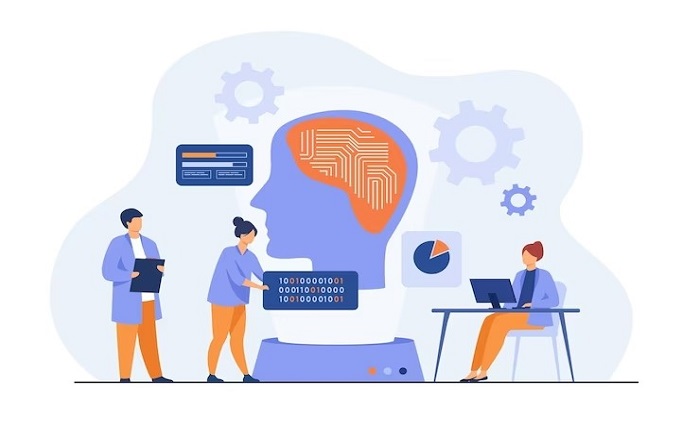We are living in a tech-filled bubble, where every second a new tech innovation is making a positive impact in our daily lives, be it in professional or personal space.
As technology continues to advance rapidly, it’s becoming increasingly important for businesses to keep up with the latest trends.
This is particularly true for businesses, when they Hire android developers, they must ensure to stay at the forefront of innovation in order to remain competitive.
With the widespread adoption of smartphones and tablets, there is a growing demand for user-friendly, highly functional mobile apps that provide users with a seamless experience.
In order to meet these demands, app developers must stay up-to-date on the latest technologies and trends to ensure that their products are always cutting-edge.
AI and ML integration into mobile apps
By 2030, the AI market is forecast to have a value of 21 billion U.S. dollars.
As technology advances, mobile applications have become an integral part of our daily lives. With the help of machine learning and artificial intelligence, these apps are able to provide personalized experiences and make our lives easier.
Mobile app developers who are able to successfully Integrate AI and ML in Android app gain a competitive advantage in the market and are better able to meet the needs of their users.
However, the process of integrating these technologies requires a deep understanding of their capabilities and limitations, making it crucial for developers to stay up-to-date with the latest advancements.
AI powered apps for different sectors
Artificial Intelligence and Machine Learning have become ubiquitous in diverse fields, from healthcare to finance, and technology companies have integrated AI into almost every aspect of our lives, including in mobile applications that we use daily.
AI-powered virtual assistants, chatbots, and personalized recommendation systems are just a few examples of how AI has transformed the mobile app industry.
These intelligent platforms have enabled smartphone users to experience more personalized, intuitive, and efficient services than ever before.
Furthermore, AI and Machine Learning continue to optimize mobile app functionality, allowing developers to Integrate AI and ML in Android app and build a more seamless and robust experience for users.
Let’s get a closer look at some of the prominent sectors using AI powered apps
- Retail apps– With the development of AI-integrated retail service and apps, we are now able to purchase products from the comfort of our own homes and enjoy a better shopping experience. This novel technology has revolutionized the way we shop and made it more convenient and efficient for customers.
- Food apps– With the rise of AI-integrated food delivery apps, the process of ordering food has become much simpler. These apps not only allow us to easily access menus of nearby restaurants but can also show us the ones that deliver the kind of food we enjoy ordering.
- Healthcare apps – AI is being used to improve the quality of healthcare service, with the help of apps that collect patient data and then use it to determine the best treatment.
- On-demand ride apps– By displaying real-time location updates of their rides, AI technology has made it easier for users to track their drivers and estimate arrival times.
- Education apps– AI-powered education is transforming how individuals learn and shaping the future of the education industry.
Well, these are just a glimpse of AI powered app use cases, and the possibilities are numerous.
But the bigger question comes how do you integrate AI into your mobile app?
So let’s get started and explore how to make this technology work for your business.
Different ways to integrate AI into your mobile app
In recent years, Machine Learning and Artificial Intelligence have made great strides in increasing the efficiency and intelligence of various technological applications.
When it comes to the world of mobile apps, these technologies have the potential to revolutionize the user experience. There are three primary ways in which the power of Machine Learning and Artificial Intelligence can be incorporated into mobile apps to make the application more efficient, sound, and interesting.
These include:
Reasoning
Artificial Intelligence (AI) and Machine Learning (ML) are two advanced technologies that are rapidly revolutionizing how we interact with computational systems.
To Integrate AI and ML in Android app requires analyzing and understanding large amounts of data that would be too difficult or time-consuming for human analysts.
They have already been applied to various industries, including healthcare, finance, and transportation. The implications of these technologies for the future of work and society as a whole are tremendous.
One of the most intriguing aspects of AI lies in its ability to harness its thinking capacities, allowing machines to process and analyze vast amounts of data at unprecedented speeds.
This powerful tool has the potential to transform a variety of fields, from healthcare to finance to transportation.
As mentioned above, the possibilities are endless, and as researchers continue to unlock new applications for AI, its impact on society is sure to grow even more profound in the coming years.
Recommendation
Have you ever wondered how Amazon recommends products based on your browsing history? Or how can Netflix recommend movies and TV shows that you might like based on your viewing history?
This all happens due to machine learning algorithms, which are designed to learn patterns in data and make predictions based on those patterns.
AI uses data to predict and make decisions about future results. It makes decisions based on the data that has been fed into it.
Behavioral
As technology advances, so do the threats to security. Artificial Intelligence has enormous potential to help overcome these threats, but it requires a deeper understanding of how users behave in various applications.
By analyzing user behavior, AI systems can identify unusual or suspicious activity and flag it for further investigation, potentially preventing security breaches before they occur
This kind of precision is crucial in today’s world, where even a single breach can have serious consequences.
Now that we have seen different ways to implement Artificial Intelligence, will jump next to the BIIIG question- what are the advantages of AI integration in mobile apps.
Is it really worthy to implement AI in mobile apps?
To Integrate AI and ML in Android app is a new trend that has been in the limelight recently. Despite its popularity, many of us are still not aware of the ample benefits that come with integrating AI in mobile apps.
Let’s find out more:
Bring personalized experience
This technology can help users make informed decisions about everything from what products to purchase to which investments to make. The benefits of this technology are abundant, making it a game changer for many industries and businesses.
With the ability to quickly and accurately process large amounts of data, AI algorithms have the potential to revolutionize the way we live our lives.
The algorithm takes advantage of machine learning and deep learning techniques to analyze large amounts of data and continuously improve its recommendations.
In addition, with the integration of AI, mobile applications can provide users with a more personalized and convenient experience, which ultimately leads to increased user engagement.
Advance search capabilities
This app will utilize the latest in artificial intelligence technology to deliver the most comprehensive and accurate search results possible.
With its intuitive user interface and powerful search algorithms, you’ll be able to quickly and easily find whatever it is you’re looking for.
When you Hire android developers, the app will continuously learn from your search history and behavior, further improving its ability to deliver personalized results.
Emerging tech powered applications have revolutionized the way businesses gather user data. From search histories to typical actions, mobile applications collect vast amounts of data that can be used to enhance the user experience.
But it’s not just about collecting data; this information can also be used to rank products and services and show the best applicable outcomes to users. This can result in a personalized experience that can greatly improve customer satisfaction and boost brand loyalty.
User behavior prediction
AI based machine learning app development has become a game changer in today’s digital world.
With the ability to understand users’ preferences and behavior patterns through the analysis of diverse data points such as age, gender, location, search histories, and app usage frequency, businesses can now develop more sophisticated and effective mobile applications.
Machine learning algorithms can identify hidden insights and provide personalized experiences that engage and retain users.
Show relevant ads
Using AI-powered apps, companies can gather data on customer preferences, behavior, and demographics to create personalized campaigns that resonate with the target audience.
This not only improves the ROI on marketing budgets but also helps build the brand reputation by delivering relevant and engaging content to potential customers.
In today’s digital age, where brands are constantly vying for attention, AI-powered marketing can give companies a competitive edge.
Enhanced security shell
Artificial intelligence and machine learning are rapidly changing the way we interact with mobile applications. In particular, these technologies have the potential to greatly streamline and secure app authentication processes.
By using machine learning algorithms to analyze user behavior patterns, these applications can provide a more seamless and user-friendly experience.
Furthermore, the use of biometric authentication methods such as facial recognition or fingerprint scanning can greatly enhance security while also simplifying the login process.
Steps to implement AI into apps
#1- identify the app area where to implement AI
Artificial intelligence technology has changed the way we interact with our devices. It has the capability to revolutionize existing mobile apps and provide users with a more personalized experience.
But identifying which section of an app can benefit from AI is crucial. By analyzing user data and behavior patterns, it is possible to determine areas that can be improved with AI technology, whether it’s streamlining the registration process or offering personalized recommendations to users.
#2- Examine data
When it comes to training a successful AI model within Android app development services, quality of the data is an import factor.
When training an effective AI model in Android app development services, data quality plays a critical role. It involves eliminating irrelevant or inaccurate data points and ensuring the dataset is free from errors or duplicates.
By investing time in cleaning and preparing the data before feeding it into the AI module, you significantly enhance the accuracy and effectiveness of the resulting model.
You should remember, the data should be clean, have no duplication, and be informative enough.
#3- Right metrics integration
Artificial Intelligence (AI) and Machine Learning (ML) have become more popular among developers.
It is a chance to make the mobile app more advanced and interactive, but before diving into these technologies, it is essential to evaluate what the mobile app will achieve.
Mobile app developers should lay out a clear plan of what their objectives are before starting to incorporate AI or ML. In this way, developers can ensure that they don’t go off track and achieve unattainable or even irrelevant objectives.
#4- Look beyond APIs
Artificial Intelligence (AI) is becoming an increasingly important aspect of mobile app development. However, implementing AI can be a complex task that requires a deep understanding of its capabilities, limitations, and potential pitfalls.
One of the biggest challenges when it comes to implementing AI in a mobile app is understanding that unsound APIs can result from extensive use. This can lead to issues with app performance, security, and the overall user experience.
#5- Determine app performance
You should know that old data, such as outdated user behavior or irrelevant feedback, can have a significant impact on the accuracy of the Machine Learning algorithm.
The quality of the training data directly affects the model’s performance on new data. To enhance the Machine Learning model and cater to user needs, it’s essential to integrate a superior data logging system and implement methods to identify and eliminate irrelevant or outdated data. This approach ensures an improved model that meets user requirements effectively.
When you Hire android developers, you must ensure your mobile application is better equipped to handle Machine Learning algorithms and provide users with better results.
#6- Conduct performance test
Artificial Intelligence (AI) is becoming increasingly popular in the world of technology and app development. However, just because AI is a buzzword, that does not mean it will automatically lead to success.
To determine if implementing AI in an app will benefit a business, it is necessary to perform a quick possibility test. This test can assess whether AI will improve user experience and increase engagement with the app.
Final Verdict
We cannot deny the significance of mobile apps in recent years. With the rise of smartphones, businesses have discovered the potential of developing mobile applications to reach their customers on the go.
However, as the competition grows, developers are constantly seeking ways to improve their app solutions. AI and ML play a crucial role in enabling developers to build smarter and efficient apps.
Indeed, Artificial Intelligence (AI) and Machine Learning (ML) are two distinct and powerful technologies that have been driving innovation in various industries.
However, it is time to take them to the next level by combining them to bring out the best in applications.
By using AI and ML together, businesses can achieve top-notch performance and quality that was once unimaginable.
It goes without saying, the future is bright for AI and ML, and the only limit is our imagination.
Conclusion
Include emerging technologies in your app development for a competitive edge. AI and ML enhance your apps and give you an advantage in the market.







